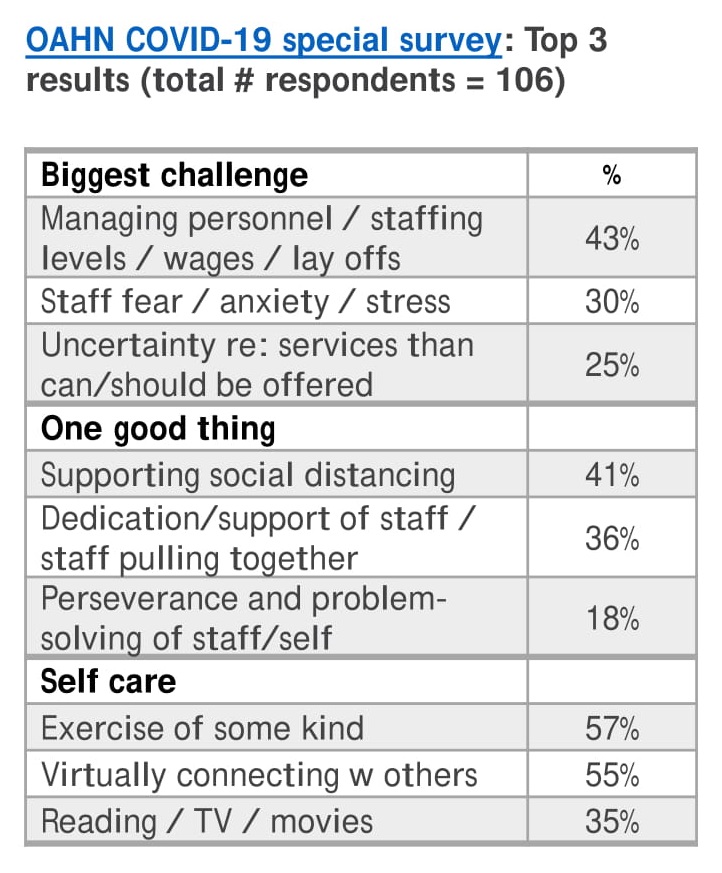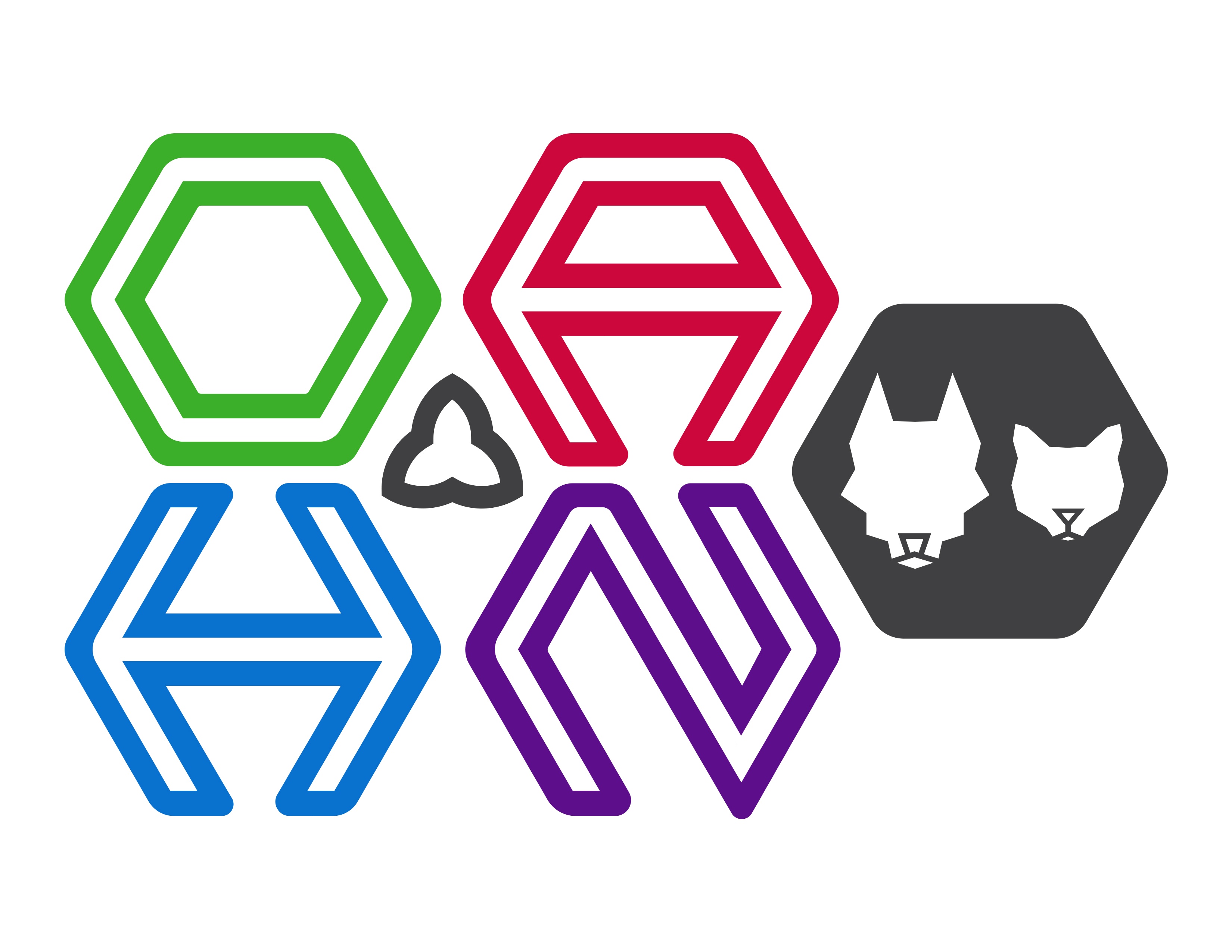Ontario Animal Health Network (OAHN)
Companion Animal Expert Network
Disease Surveillance Digest
Dealing with COVID-19: The good and the bad
The COVID-19 pandemic affects everyone differently, but it affects everyone. The effects on Ontario veterinarians and our staff, our personal lives, businesses, finances, physical and mental health are very real and far-reaching. OAHN survey respondents shared many of their stresses, concerns and disappointments with how things have unfolded, but many also wrote of their
gratitude and pride for clients, staff and the veterinary profession where we have stepped up to these challenges. Remember we are all in this together. You are not alone. Be well and stay safe.
 Help with decision-making: Urgent vs non-urgent care
Help with decision-making: Urgent vs non-urgent care
Trying to determine what veterinary services can be provided for companion animals under the current provincial order of “urgent care only” continues to be a challenge. Below are links to several flow charts that can help with this process. Remember that as Ontario moves through the epidemic curve of COVID19 in people, delaying in-person services by a even a few days or a week or more can help decrease the risk of transmission in people – assuming this can be reasonably done based on the condition of the animal.
- BSAVA – Assessing the need for physical examination of dogs and cats
- AVMA – Determining which cases are urgent
- OVMA – Veterinary medicine during a time of restriction of elective services and social distancing (17-Apr-2020)
Veterinary mental health resources
Many of the outlets and activities we normally use to relieve stress and support our well-being are unavailable or simply not
feasible under our current circumstances due to social distancing, work load, finances or other reasons. But there are still lots of
things we can do, including alternative activities, and making small changes that are within our control can still have a powerful
effect. Use the resources below to find ideas and guidance on how to help you and your staff weather the COVID-19 storm.
- Well-being during COVID-19 (OVC)
- Webinar: Keeping psychologically safe in the face of COVID-19 (CVMA)
- Looking after yourself and others during COVID-19 (vetlife)
- COVID-19 and mental health (CMHA)
- Pandemic self-care for vet teams (AAHA)
- COVID-19 and wellbeing (AVMA)
- Free audio meditations (Headspace)
- i-matter (OVMA)
Ontario rabies update
Only one case of terrestrial rabies (a skunk in the Hamilton area) has been detected in Ontario since the first week of December
2019. Positive bats (4) continue to be detected throughout the province periodically. Remember that while routine vaccinations for many animals can be reasonably delayed at this time, vaccination within 7 days of a high-risk wildlife exposure is still considered urgent if rabies cannot be ruled out through testing or other means.
Update on other infectious diseases
Rest assured, OAHN is still on the lookout for other animal disease issues in Ontario! Based on our survey responses and lab data, it was a fairly quiet quarter. A few of the concerns reported by survey respondents were:
- early emergence of ticks this year, including during mid-winter warm spells,
- increased numbers of dogs seropositive for exposure to Lyme disease,
- two local dogs diagnosed with heartworm infection, particularly in light of reduced ability to test other dogs this year because of COVID-19 precautions.
In Brief: SARS-CoV-2 in companion animals
Our collective knowledge of how the SARS-CoV-2 virus affects pets and other animals is evolving rapidly. Here are some high-level key points of what we think we know right now, and some of the associated key messages and recommendations. Additional details and further updates are available on the resource websites on the next page.
- At this time, there is evidence that cats, ferrets, hamsters, and dogs can be infected with SARS-CoV-2 and cats, ferrets and hamsters may develop illness. Only mild respiratory signs have been reported in cases of natural infection to date. Coronaviruses in general can cause either respiratory or gastrointestinal illness in animals.
- There have not been any reports of transmission from a domestic animal to a person, despite the widespread pandemic. There is limited evidence that ferrets, cats, and hamsters can spread the infection to other naïve animals of the same species, under experimental conditions. Dogs have not been found to be able to transmit the virus to other dogs.
- Although there is a potential risk of exposure to SARS-CoV-2 through contact with a contaminated hair coat, there is only a theoretical risk of transmission of the virus to a person through this route. However, the risk is not zero, and may vary depending on circumstances.
- The primary means of managing the in-clinic risk of virus transmission from an infected or contaminated pet (i.e. from a household with an infected person) are the same as those used for preventing transmission of other zoonotic diseases (e.g. hand hygiene, use of gloves and protective outerwear, enhanced cleaning and disinfection of surfaces, minimizing contact as much as possible).
- Some additional precautionary measures to consider include:
- Wiping down animals with a pet-friendly disinfectant (or potentially bathing, depending on circumstances) could theoretically help to reduce any possible hair coat contamination.
- If close contact with the animal is required, a mask / face shield / eye protection should be used prevent facial contact (eyes, nose, mouth) with the animal directly (hair coat/fur) or with respiratory droplets/aerosols.
- Respirators (i.e. N95 masks) should be used when there is a risk of infectious aerosols (i.e. cat or ferret with respiratory signs, or aerosol-generating procedure (intubation, bronchoscopy)).
- Routine testing of animals for SARS-COV-2 is not recommended. The greatest risk of infection to people (and animals) is still other people.
COVID-19 and pets: Key resources
For a more complete list of resources and the latest links, visit the OAHN COVID-19 related resources for veterinarians webpage.
Latest updates and Ontario guidelines:
Scientific reviews:
- Current state of knowledge (ISCAID)
- FAQ for vets (Mar. 30) (Can. COVID-19 WG)
- Update coming soon!
- Infection & fomite transmission (SYREAF)
Veterinary guidance:
- Veterinary medicine during a time of restriction of elective services and social distancing (17-Apr-2020) (OVMA)
- Updates for Ontario vets (CVO)
- IPC for vet clinics during COVID-19 (CDC)
Animal testing:*
- CCVO position statement – coming soon!
- Diagnostic update (IDEXX)
- Evaluation for animal testing (CDC)
Owner FAQs:
*Routine testing of pets for SARS-CoV-2 is not recommended. If you have a patient with signs of respiratory or GI illness for which other common conditions have been ruled out, and the animal has been in contact with a person with COVID-19 in the last two weeks and SARS-CoV-2 infection is a differential diagnosis, contact the Office of the Chief Veterinarian for Ontario for further guidance, through the OMAFRA Agricultural Information Contact Centre at 1-877-424-1300.


